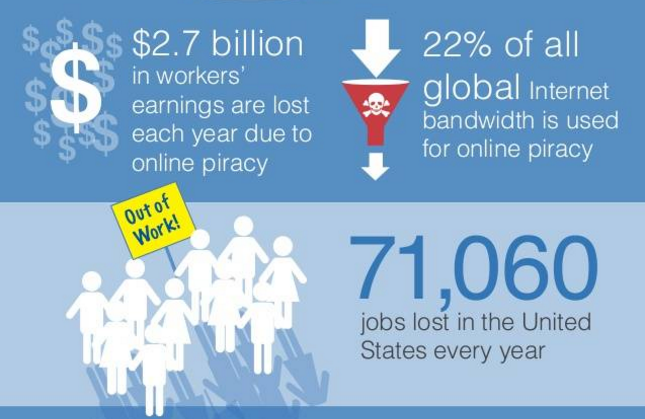
This online news of March, 2016 (Figure 1.) has make me feel very curious to discover what makes Online Piracy becomes so seriously to be called as a crime?
Though I’ve learned about piracy within mass media in class but now I want to concentrate more on Online Piracy due to the high range of Internet using globally.
So, what is Online Piracy and when was it happened?
There are many definitions of Online Piracy but I prefer this simple ones. Online Piracy could be understood as an act of an online user when he or she extracts the content, which they desire to have, off the victim’s website. Once being stolen, the content would be stripped of copyright or authorship information and posted on a different site and rendered as belonging to the ones who stole it.
Online Piracy has appeared long time ago since 1980s when Microsoft and Novell decided to charge fees for using their products. This is the beginning of piracy which comes from the technologists. Reasoning for this behaviour, after a period of time using software freely but suddenly they were asked to pay fees for using the things that they used to access freely, they would think that it’s not fair for them.
This phenomenon of Online Piracy climbs to peak in 1990s when the accessing to the Internet grew faster together with a peer to peer (P2P) platform called Napster appeared. This platform allow users to share any kind of online material to others.
Why does people piracy?
In fact, as my researches, there are many articles discuss about this question. And, the most common answer is because people believe that the act of online piracy is not illegal.
The statistic of Figure 2 could be the supporting element for this point of view.

People claimed that they choose to piracy just for simple desires, such as: listen to new music, playing games or watching the movie which they have missed without paying fees.
They also wonder why those normal purposes of entertaining by getting online piracy could cause to big problem?
Now, getting back to my first question: “What makes Online Piracy becomes so serious to be called as a crime?”
As we could obviously know that in order to make a movie, a music video, an app or software, MONEY is the first requirement and the amount of money which is in the requirement could be very large.
But when we come to Online Piracy, everything is “Free Download” and with the “help” of technology development – a tool called Internet Download Manager (IDM). Then, how could the original authors could get their money back?
From this point of view, no need to explain, we could imagine how much Online Piracy could “harm” the authors’ profits in particular and other entertainment fields in general.

Besides the effects caused by Online Piracy which showed in Figure 3, there are two fields which being effected the most:
– Economic loss: $17 billion per year (Pardon 2014).
– Music industry loss: 12.5 billion per year (Sun 2015).

